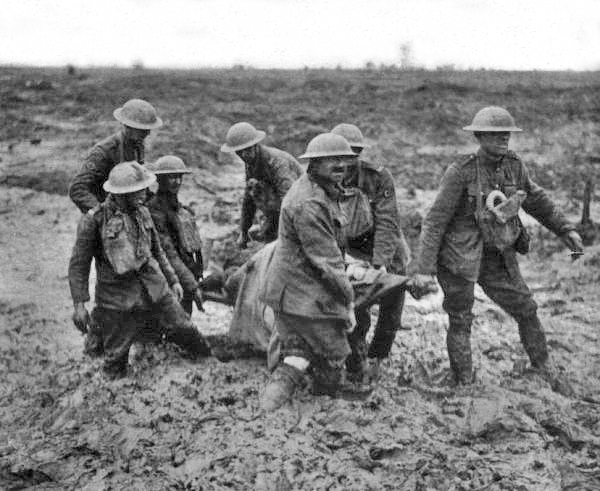Conscientious Objectors
While army sign up was high during World War One, there were many people who simply did not want to fight in the war, and these people became known as the conscientious objectors.
Also known as ‘conscious’ or CO’s, conscientious objectors were seen as a clear sign that not every member of the public was as enthusiastic about the war the government had initially believed. In fact, following the release of figures relating to the number of casualties in battles such as the Somme and Ypres, the number of people signing up to the British Army as volunteers was starting to fall.
It was in response to this that the British government decided to introduce conscription, and in 1916 the law was changed so that it was a legal obligation for men to service in the military for a certain period of time. However, there was a clause included that stated those who had a “conscientious objection to bearing arms” were freed from this obligation. As a result, four different type of CO evolved:
- Pacifists who were against any war in general.
- Political objectors who did not consider the German government to be an enemy.
- Religious objectors who believed war was against their religion, such as Quakers and Jehovah Witnesses.
- A combination of the above.
However, there were also some CO’s who were against fighting but still wanted to ‘to their bit’ for the country. This often involved working in factories or helping even closer to the front line by becoming stretcher bearers in the trenches on the Western Front.
Meanwhile, there were other CO’s who completely refused to get involved in the war, and these were referred to as ‘absolutists’.
Anyone who tried to use the clause to get out of service was required to face a tribunal to explain why they were not willing or able to fight.

By the end of 1915, more than 528,000 people had been lost from the British Army due to being killed, rounded or missing. However, Volunteers to ‘Kitchener’s Army’ had also begun to reduce. Conscription aimed to deal with situations such as this, but it became a rather controversial issue. Commenting on the idea of conscription, Lord Roberts wrote:
"Compulsory service is, I believe, as distasteful to the nation as it is incompatible with the conditions of an Army like ours, which has such a large proportion of its units on foreign service. I hold moreover, that the man who voluntarily serves his country is more to be relied upon as a good fighting soldier than is he who is compelled to bear arms."
When conscription was eventually introduced in 1916, it was known as the Military Service Act. Despite this, it soon became known by many as the ‘Batchelor’s Bill’ due to the fact that conscription only included unmarried men between the ages of 18 and 41. However, by May 1916 it was expanded to include married men, and by April 1918, all men from 18 to 51 were obliged to take part in the war effort.
As the net widened, more and more people began to object to the act in spite of the CO clause. A No-Conscription Fellowship was founded early in the war and produced the following leaflet to explain why it felt the act of enforcing conscription was wrong.
|
Repeal the Act Fellow citizens: Conscription is now law in this country of free traditions. Our hard-won liberties have been violated. Conscription means the desecration of principles that we have long held dear; it involves the subordination of civil liberties to military dictation; it imperils the freedom of individual conscience and establishes in our midst that militarism which menaces all social graces and divides the peoples of all nations. We re-affirm our determined resistance to all that is established by the Act. We cannot assist in warfare. War, which to us is wrong. War, which the peoples do not seek, will only be made impossible when men, who so believe, remain steadfast to their convictions. Conscience, it is true, has been recognised in the Act, but it has been placed at the mercy of tribunals. We are prepared to answer for our faith before any tribunal, but we cannot accept any exemption that would compel those who hate war to kill by proxy or set them to tasks which would help in the furtherance of war. We strongly condemn the monstrous assumption by Parliament that a man is deemed to be bound by an oath that he has never taken and forced under an authority he will never acknowledge to perform acts which outrage his deepest convictions. It is true that the present act applies only to a small section of the community, but a great tradition has been sacrificed. Already there is a clamour for an extension of the act. Admit the principle, and who can stay the march of militarism? Repeal the Act. That is your only safeguard. If this be not done, militarism will fasten its iron grip upon our national life and institutions. There will be imposed upon us the very system which statesmen affirm that they set out to overthrow. What shall it profit the nation if it shall win the war and lose its own soul? |
All of the men who signed the leaflet above were charged under the Defence of the Realm Act, and were fined for their actions. Those who refused to pay the fine were sent to prison.
MLA Citation/Reference
"Conscientious Objectors". HistoryLearning.com. 2026. Web.
